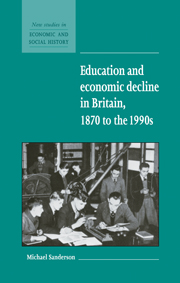Book contents
- Frontmatter
- Contents
- Acknowledgements
- Glossary and abbreviations
- Introduction
- 1 Literacy and schooling, 1870–1914
- 2 Was technical education to blame?
- 3 The counterarguments
- 4 The education of the élite, 1870–1914
- 5 Missed opportunities, 1914–1944
- 6 Post-war decline – the betrayed teenager?
- 7 Higher education and the public schools – privilege and relevance
- Conclusion
- Bibliography
- Index
- New Studies in Economic and Social History
- Studies in Economic and Social History
- Economic History Society
6 - Post-war decline – the betrayed teenager?
Published online by Cambridge University Press: 05 June 2012
- Frontmatter
- Contents
- Acknowledgements
- Glossary and abbreviations
- Introduction
- 1 Literacy and schooling, 1870–1914
- 2 Was technical education to blame?
- 3 The counterarguments
- 4 The education of the élite, 1870–1914
- 5 Missed opportunities, 1914–1944
- 6 Post-war decline – the betrayed teenager?
- 7 Higher education and the public schools – privilege and relevance
- Conclusion
- Bibliography
- Index
- New Studies in Economic and Social History
- Studies in Economic and Social History
- Economic History Society
Summary
The post-war years saw a revival of preoccupation with decline, so important in the rhetoric of the late Victorians and Edwardians but less so in the inter-war years. Tomlinson sees this revival of concern as dating from the late 1950s and early 1960s (Tom-linson, 1996). The need to modernise became an issue in successive general elections as the party out of office could gain political advantage by accusing the incumbent government for failing to ‘catch up’ on some ‘falling behind’. Statisticians began to compile systematic data on national income and national product from the 1950s making comparisons possible between Britain and competitor countries. Also ‘productivity’ to which much attention had been paid in wartime came to be regarded as yet another criterion of performance in the 1950s. Behind that was the belief that quality of manpower, or ‘human capital’ as it was called in the early 1960s was an element in productivity and hence in growth performance. The growing interest in the economics of underdeveloped countries in the 1950s also focused attention on education as an element in growth. Accordingly from the 1950s and 1960s revived attention was paid to education in the belief that its defects contributed to decline or that its reform could allay it.
In the post-war years Britain's poor economic performance became more marked. The United Kingdom's regular 2.5–3 per cent growth compared modestly with France's 4–6 per cent, Germany's 4–9 per cent, the United States' normal 4 per cent, let alone Japan's 7–11 per cent.
- Type
- Chapter
- Information
- Publisher: Cambridge University PressPrint publication year: 1999



